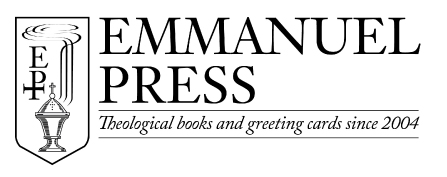THE LATEST NEWS
Seed-Grains of Prayer: Prayer of Sponsors Before Baptism
“O Lord, triune God, who hast commanded Thy servants to go and baptize in the name of the Father, and of the Son, and of the Holy Ghost, be present now with Thy servants in the administration of this Sacrament, and open Thy heavens as Thou openedst them over Jordan, that souls may daily be added unto Thy congregation who shall be blessed. Rule and govern all who are present at this Baptism, that they remember that Baptism is from heaven and not of man, though it be applied by man’s hands; in order that all may be here present in reverent humility, as at a work instituted by Thee. Maintain among us always the Sacrament of Baptism in unaltered purity. Let nobody’s child be denied the benefits thereof; and, if at times some attain not unto Baptism, being overcome by death, comfort their parents and friends by Thy Word, that they may entertain no doubt of salvation. Finally, since we all believe in one Lord, one faith, one Baptism, one God and Father of all, grant that we be diligent to hold the unity of Spirit in the bond of peace; and, together with all the baptized, complete our course in the oneness of the hope of our calling. Amen.”
Wilhelm Loehe, Seed-Grains of Prayer, #328
Seed-Grains of Prayer: Upon Undertaking a Business Journey
“O Lord, Almighty God, Who, in times past, didst miraculously lead Thy people Israel through a wilderness, guiding them with clouds and fire, a covering by day and a light in the night, since I must now undertake a journey in pursuit of my calling, I most heartily beseech Thee to accompany me and go before me, to lead me in the right way and in due time to bring me back in safety. Bear me, O merciful God, dear Father, as a man bears his little son, upon all the way which I will have to go. Protect me with Thy hand and save me from the hands of enemies. Cause Thy holy angels to go with me, and prosper all my undertaking, that I may deal wisely, succeed in my work, and return to my home joyfully. Preserve my going out and my coming in, from this time forth and forever. Amen.”
Wilhelm Loehe, Seed-Grains of Prayer, #116
Seed-Grains of Prayer: For Grace to Keep our Baptismal Covenant
“Dear Lord and Savior, Jesus Christ, eternally true Son of God, we are baptized into Thy death and made partakers of Thy merit, that, being redeemed from sin, we may be truly holy and righteous before our heavenly Father. In our Baptism we promised to die unto the sin that remaineth in us and to walk in newness of life. We beseech Thee, therefore, to enlighten and to strengthen us by Thy Holy Spirit to renounce all sinful lusts and to live to please Thee; Who reignest with the Father and the Holy Ghost in all eternity. Amen.”
Wilhelm Loehe, Seed-Grains of Prayer, #15
Additions to our Website
We are working steadily to provide more information, links, and resources on our website. Recent additions include a brief history of Emmanuel Press (in the About Us section) and information about submitting your own works and ideas for possible publication (in the Contact Us section). In the next few days, we will be adding a section for links to reviews about Emmanuel Press and its books. If you know of an article or blog post to include in that list, or if you have any suggestions for helpful resources, please leave a comment here or contact us.
Also, we will soon be announcing the release of Starck’s Motherhood Prayers for All Occasions!
Wilhelm Loehe’s Seed-Grains of Prayer is now available! ….and other news
Nearly a century after the first English edition of Wilhelm Loehe’s Seed-Grains of Prayer, we are pleased to announce that this timeless treasure is now in stock and ready for online order! Additionally, you will find this book at our display table in Upper Loehe Hall at next week’s annual Symposia at Concordia Theological Seminary in Fort Wayne, Indiana, along with all of our other titles. Brenda Frese, mother of our own Chaplain Michael Frese, has graciously agreed to represent Emmanuel Press at the Symposia. This new printing of Seed-Grains of Prayer also coincides nicely with this summer’s third triennial meeting of the International Loehe Society .
Redeemer Lutheran Church in Fort Wayne will once again host a free conference on the Monday before the Symposia. There will also be an afternoon session of learning to read and sing Gregorian chant as presented in The Brotherhood Prayer Book with Rev. Dr. Benjamin T.G. Mayes. Books will be available for purchase there, too.
Unfortunately, we have had an unexpected delay in the printing of Starck’s Motherhood Prayers for All Occasions, so it will not be available at the Symposia, but we will be sure to announce here as soon as it is in stock. We expect to have this resolved by the end of the month. In the meantime, we do have a PDF download on the Starck’s Motherhood Prayers tab so that you can preview this excellent collection of prayers for expectant mothers.
We will also be offering special prices online and in Fort Wayne for two of our items in honor of the upcoming Symposia week. The Brotherhood Prayer Book Audio CD is now available for $10 (regularly $15), and Starck’s Prayer Book (which does contain Starck’s Motherhood Prayers for All Occasions in the back of the book) will be $15 (regularly $20).

Let’s stay in touch! To receive the most current information on our products and new releases, join our email list today!

